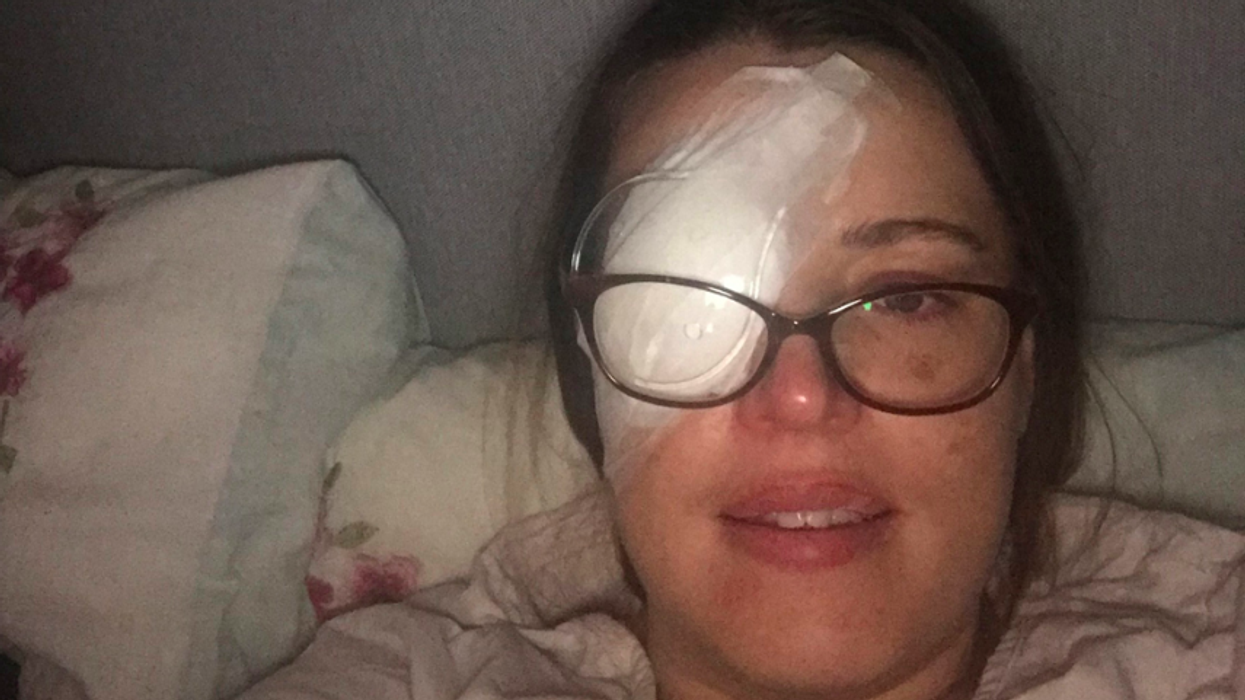When white dots bounced around her line of vision as she packed for a Greek Island holiday, a woman was convinced her neighbor was “shining a laser through her window" – only to find her disturbed vision was caused by cancer.
Then, soon after seeing the dots, a “white film" appeared over her right eye when she blinked, as she folded clothes for her Kefalonia trip in September 2018, prompting Kerry Williams, 32, to book a precautionary optician's appointment – a move which saved her eye.
For the specialist pensions regulator, of Eastbourne, East Sussex, whose husband Ben, 36, is an engineer, was diagnosed with ocular melanoma in her right eye – a rare tumor that affects up to just 650 people in the UK each year, according to charity OcuMel UK.

She said: “It wasn't until two months after the eye test that doctors told me the tumor was malignant. Up until that point I hadn't been alarmed at all.
“Then, all of a sudden, the consultant said he had considered removing my right eye and it all hit me"
Kerry first noticed something was wrong the night before her holiday when she asked her husband to investigate a “white flashing light" that was darting across the bedroom, only to be shocked when he “didn't have a clue" what she was talking about.
“I asked him to look through the window and see if anyone out there was playing with one of those laser pens, but he looked at me like I was mad," Kerry recalled.
“I put it down to stress before a much-needed holiday and tried not to think much more about it."
But when the flashes of white became more regular and she noticed a white film appear across her eye, clouding her vision every time she blinked, Kerry decided to book an appointment at her local Vision Express.
“The opticians didn't say much, but they did spend a good 20 minutes looking at the back of my eye," she said.
“Then they told me I needed to go to hospital.
“I thought they meant by referral, but they told me I needed to get to A&E straight away."

Arriving at Eastbourne District General Hospital, Kerry was seen by “at least four" doctors who continued to observe the back of her eye, before they performed an ultrasound.
“The doctors were all a bit baffled," she continued. “They couldn't seem to see anything that was causing the problem."
Referred for more tests at London's world-famous Moorfields Eye Hospital in November 2018, further scans revealed she had a cancerous tumor on the back of her right eye.
“For two months there had been no sense of alarm – then suddenly the medics were telling me they'd found a mole on the back of my eye and that it was malignant. I just didn't expect it," she said.
“They said a lot of people have the cancer left undiagnosed for years and it can lead to losing the eye, so I should count myself lucky."
In January this year, Kerry had surgery to fit a radioactive plaque at the back of her eye – a disc which applies high levels of radiation to a small area – and it was able to administer just the right amount of radiotherapy needed to treat the cancer.
“It was my first ever operation, so I was quite panicked," she recalled.
“The whole thing was very sci-fi – I could feel this piece of metal scraping against my eye.
“I wasn't allowed to see visitors for more than two hours at a time because I was technically radioactive."
She continued: “It was quite funny, if I went to the toilet, I'd have to get the Geiger meter, a device used to measure radioactive waves, to make sure the plaque hadn't fallen out before I flushed.
“It makes a very distinct sound, an unpleasant sort of crackling, and once I was going to the toilet in the dark and scared the hell out of another patient – it was like something out of a horror movie."
With the plaque removed after four days, Kerry then faced a six month wait before finding out if the treatment had worked.

Sadly, the tumor, which was 2.3mm, had not shrunk and doctors decided they wanted to monitor it closely to check there were no signs of further growth.
“It's shown no sign of growing either, which is a good thing," she explained. “Now I'm being monitored every six months to see what happens.
“What scares me is how aggressive this form of cancer can be. I've done research and in a lot of cases it spreads."
“Ultimately the tumor could grow, and my eye could still be removed, but I like to think I've caught it early enough that that won't happen," she continued.
“The point of the treatment hasn't been to remove the tumor but to stop it growing and shrink it, so in some ways there'll always be a fear that the cancer might spread down the line.
“I've been told I'll need regular scans for the rest of my life but there's some debate in the medical community whether it's really necessary after 15 years."

“Now I get such bad anxiety – or 'scanxiety' – every time I'm close to a check-up," she added.
Still, Kerry is determined to stay positive and to raise awareness of this form of cancer.
She said: “It really highlights the importance of going for regular eye tests and more needs to be done to make people aware that an eye test can detect life-threatening conditions."

She concluded: “I'm raising funds for OcuMel UK, a charity that specifically focuses on research for this kind of cancer and have raised over £1,000 ($1,293) so far after climbing Snowdon, Wales' highest mountain, and I'm hoping to raise more and more.
“People think eye tests are time consuming but, in reality, it's essential we all go for them. I might not be in the all clear yet but I'm so grateful I went to Vision Express and we caught my cancer when we did."
To donate to Kerry's fundraiser, visit www.justgiving.com/fundraising/kerry-williams87








 Roberto Schmidt/AFP via Getty Images
Roberto Schmidt/AFP via Getty Images





 u/pizzaratsfriend/Reddit
u/pizzaratsfriend/Reddit u/Flat_Valuable650/Reddit
u/Flat_Valuable650/Reddit u/ReadyCauliflower8/Reddit
u/ReadyCauliflower8/Reddit u/RealBettyWhite69/Reddit
u/RealBettyWhite69/Reddit u/invisibleshadowalker/Reddit
u/invisibleshadowalker/Reddit u/Wishnik6502/Reddit
u/Wishnik6502/Reddit u/kateastrophic/Reddit
u/kateastrophic/Reddit u/blking/Reddit
u/blking/Reddit u/SlagQueen/Reddit
u/SlagQueen/Reddit u/geezeslice333/Reddit
u/geezeslice333/Reddit u/meertaoxo/Reddit
u/meertaoxo/Reddit u/crystal_clear24/Reddit
u/crystal_clear24/Reddit u/stinkpot_jamjar/Reddit
u/stinkpot_jamjar/Reddit
 u/Bulgingpants/Reddit
u/Bulgingpants/Reddit
 @hackedliving/TikTok
@hackedliving/TikTok @hackedliving/TikTok
@hackedliving/TikTok @hackedliving/TikTok
@hackedliving/TikTok @hackedliving/TikTok
@hackedliving/TikTok @hackedliving/TikTok
@hackedliving/TikTok @hackedliving/TikTok
@hackedliving/TikTok @hackedliving/TikTok
@hackedliving/TikTok @hackedliving/TikTok
@hackedliving/TikTok @hackedliving/TikTok
@hackedliving/TikTok @hackedliving/TikTok
@hackedliving/TikTok
 @vanderjames/Instagram
@vanderjames/Instagram @vanderjames/Instagram
@vanderjames/Instagram @vanderjames/Instagram
@vanderjames/Instagram @vanderjames/Instagram
@vanderjames/Instagram @vanderjames/Instagram
@vanderjames/Instagram @vanderjames/Instagram
@vanderjames/Instagram @vanderjames/Instagram
@vanderjames/Instagram @vanderjames/Instagram
@vanderjames/Instagram @vanderjames/Instagram
@vanderjames/Instagram @vanderjames/Instagram
@vanderjames/Instagram